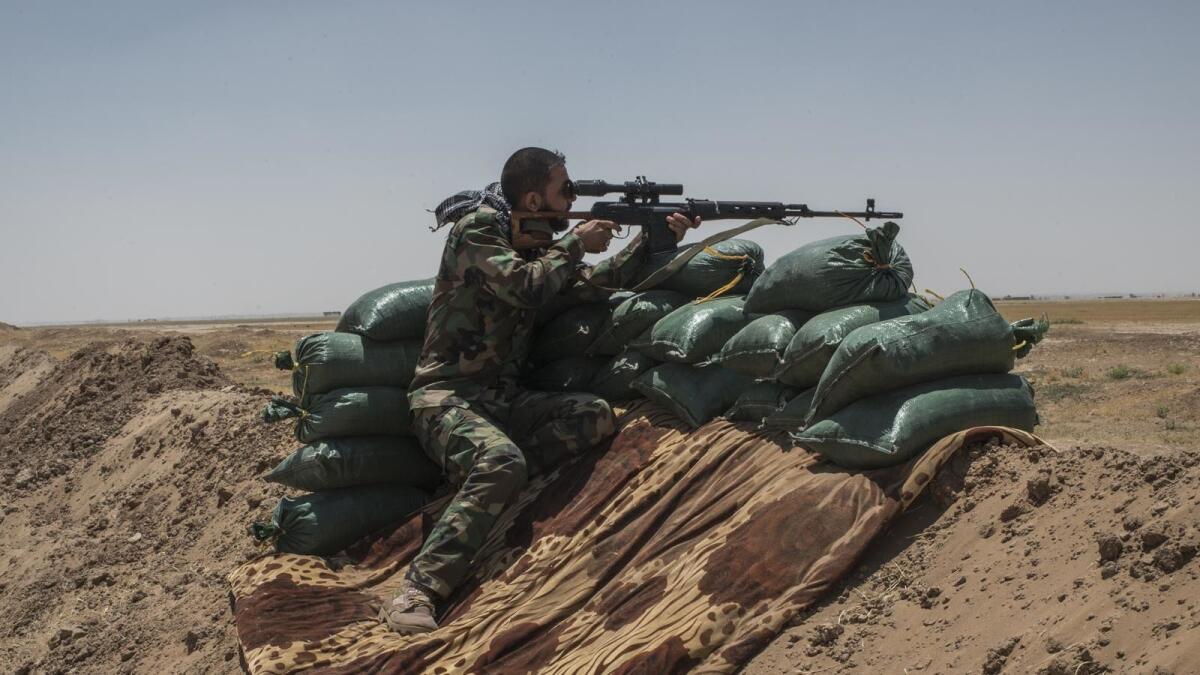Canadian sniper kills an Islamic State fighter from more than 2 miles away, a record shot

- Share via
Imagine taking a rifle to the end zone of a football field, peering through your scope at a target 38 football fields away, then squeezing the trigger and hitting that target. That’s a two-mile shot.
If you’re in Los Angeles, that’s like shooting from the roof of Staples Center and hitting a target at the L.A. Coliseum. In Las Vegas, it would be like making a shot from the MGM Grand to the Wynn.
That’s what a Canadian sniper accomplished in Iraq when he killed an Islamic State fighter from a distance of 3,540 meters, or almost 2.2 miles, setting a record for the longest kill shot in military history.
The Canadian Special Operations Forces Command released a statement Wednesday confirming that a member of Joint Task Force 2 made the shot, but for security reasons did not name the sniper or say when and where the shooting took place.
The statement said only that the shot occurred within the past month, and that the task force “provides its expertise ... from well behind the Iraqi security force front line in Mosul.”
The Canadian sniper used a McMillan Tac-50 rifle, and the shot was recorded on video, said Sue Beler, communications advisor for Canadian Special Operations Forces Command. The bullet was in the air for just under 10 seconds, she said.
Guinness World Records names the previous record holder as British sniper Craig Harrison, who shot two Taliban fighters in Afghanistan from 2,474 meters, or a little over 1.5 miles, in November 2009.
The Canadian’s shot topped that by 1,000 meters. Has technology come that far in eight years? Army Staff Sgt. Jared Reinhart, a sniper instructor at Ft. Benning in Georgia, said sniper tactics and equipment are “continually evolving, but at that distance a lot of effects come into play.”
“Technology can only go so far,” said Reinhart. “At that distance, certain atmospherics cannot be mitigated. You don’t know what the wind is doing.”
Reinhart figured that “a little bit of luck was involved” in the record-breaking shot, adding that he didn’t know how many shots the Canadian took before hitting the target. But he praised the accomplishment.
The Canadian sniper, Reinhart said, “definitely outshot the capability of his weapon system.”
Dean Cork, owner and lead instructor at Crosswind Precision Marksmanship Academy near Grand Junction, Colo., acknowledged that advances in weaponry and optics have boosted marksmanship, but said “it all comes down to skill and fundamentals.”
For any long shot, the sniper must consider his altitude and weather conditions, said Cork. Also, the 10-second travel time of the bullet means the sniper must factor in the Earth’s turning beneath it.
“The spotter does a lot of that work,” said Cork, pointing out that every sniper works with at least one spotter, who consults the “DOPE,” or data on previous engagements, to determine how the sniper should adjust the rifle scope to compensate for varying conditions.
And wouldn’t the sniper have to aim high to account for the arc of the bullet?
“Your crosshairs stay on the target,” said Cork, but the rifle would be aiming about 60 feet high.
Cork said snipers come in all shapes and sizes, and both men and women can be expert shots. The best snipers are quiet professionals with great attention to detail who are “driven to never miss, to make that perfect shot under all conditions.”
Follow @molson21 on Twitter
ALSO
Qatar Airways seeks 10% stake in American Airlines amid Middle East dispute
Kushner begins shuttle diplomacy in Israel and West Bank in search of a peace breakthrough
Feud over Middle Eastern airlines reaches new extremes
More to Read
Sign up for Essential California
The most important California stories and recommendations in your inbox every morning.
You may occasionally receive promotional content from the Los Angeles Times.










